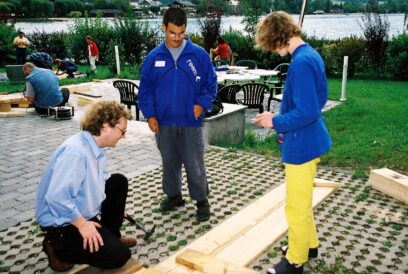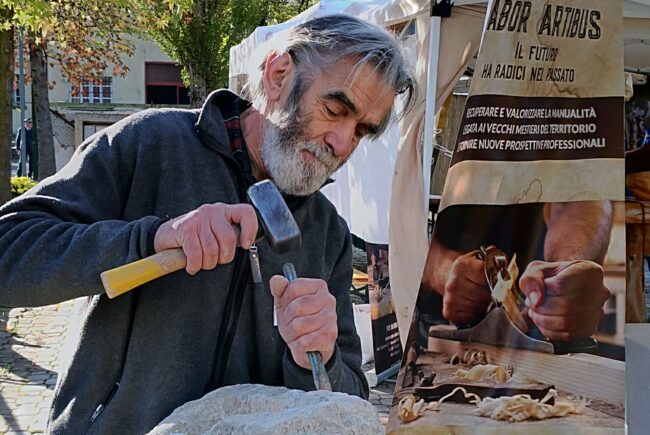

The Italian Artibus projects promotes classes where retired artisans hold workshops to teach their skills to migrants and Italian people who are unemployed. Photo: The Artibus Project.
The Italian Artibus projects promotes classes where retired artisans hold workshops to teach their skills to migrants and Italian people who are unemployed. Photo: The Artibus Project.
Can intergenerational learning save traditional crafts and be the future of apprenticeship teaching?
The future has its roots in the past, but what happens if the past disappears? This is what is worrying Jonathan Mitchell, Deputy Director of the Portfolio & Partnerships division at the UK’s Institute for Apprenticeships and Technical Education.
“There has been a longstanding fall in the prestige of apprenticeships over the last 60 years, mainly because of poor quality training, which has dented employer and learner confidence,” he says.
This problem affects not only the United Kingdom, but other European countries, too.
Intergenerational learning is the whole point of apprenticeships.
“Unfortunately, traditional crafts are in danger of dying out. We’re seeing craftsmen’s shops closing down and there are no more people who can actually do these jobs,” adds Elena Capone, who volunteers for the Artibus project taking place in Padua, Italy.
This project is promoting classes where retired artisans such as carpenters and shoemakers hold workshops to teach their skills to migrants and Italian people who are unemployed.
“Intergenerational learning could actually save the future of crafts jobs,” says Elena Capone.
Learning to start a new life
Despite working on the other side of Europe, Jonathan Mitchell agrees with Capone.
“Intergenerational learning is the whole point of apprenticeships. It’s often overlooked, but it’s a key aspect of what we do and that’s why for the past five years we’ve been working to introduce reforms to lift the quality of apprenticeships. I believe that’s one of the reasons why we’re now seeing more and more interest in these courses,” he says.
The institute is trying to involve employers in their decision-making, so that they can offer students the occupational competences employers are looking for.
“When you have different generations coming together, real magic happens: students are much more interested in the courses because they can learn practical and useful skills, and employers know that their future employees will have the skills and knowledge that they need,” says Jonathan.
In fact, despite the hardships experienced because of COVID-19, requests to join these courses are now rising, both in the UK and Italy.
“For example, since the pandemic, people have started to care more for their homes, so they want high-quality furniture and that’s why we’ve decided to ask professional carpenters to teach their job to unemployed people and migrants in Rome,” explains Gabriella Guido, the coordinator of the K_Alma Association.
This experience had made the learners much more excited about their future.
Much like in the Artibus project, the K_Alma Association is based on the idea that learning a practical and manual job from experts has great benefits to the learners. And like Elena Capone, Gabriella Guido has seen great interest from students.
“This experience had made the learners much more excited about their future. Most of them are in their 50s and are having issues finding a job. This was an opportunity for them to learn new skills and start a new life, as they’ve seen there are some entrepreneurial opportunities that can come out of these jobs. This is the power of apprenticeships: you can create your own business and future,” adds Capone.
Keeping tradition alive requires resources
But it’s not just the students who are benefitting from these intergenerational projects.
Elena Capone says that they have seen a real change in the retired craftsmen teaching the traditional job that they have been doing for years:
“So many of them felt really lonely and isolated during the COVID-19 lockdowns, so this was an opportunity to meet other people, share their passions and feel useful again. It’s clear that apprenticeship has a great potential, but the threat of crafts jobs disappearing is still a reality. In Italy, for example, there are very few institutional courses and even if we have a lot of requests from young and older students to learn these jobs, we can’t provide all of that, as we would need more funding and resources.”
The real solution to avoid losing these jobs is the development of educational projects and courses that can allow professionals to share their experience and expertise with the younger generations.
“That’s how you keep a tradition alive and our aim now is to make sure medium-sized and small enterprises are able to join our apprenticeship schemes too, so that we can have their knowledge passed on,” concludes Jonathan Mitchell.
Author






